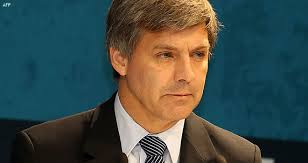By Andrew Warshaw
January 23 – As the tension builds towards next week’s deadline for official nominations to run for FIFA president, one of the prospective candidates has given the strongest indication yet that he will pull out and instead support Prince Ali bin al-Hussein in the Jordanian’s bid to unseat Sepp Blatter.
Like most of the outside contenders playing a game of brinkmanship as they assess whether or not to stand based on how much support they might receive, former Chilean federation chief Harold Mayne-Nicholls says he will make up his mind one or two days before Thursday’s cut-off point whether to put his name forward and take the risk of being heavily beaten by the veteran present incumbent in next May’s election.
In an interview with Insideworldfootball, one of his last before he has to make a decision, Mayne-Nicholls, who is understood to have recently met UEFA President Michel Platini during a round of visits to influential powerbrokers, said he was certain he could get the required five letters of support from national federations that all candidates need to meet the strict election criteria.
But he admitted there would be no point in pressing for the required written backing if he is opts not to run, hinting his ideas for a more transparent FIFA future might instead be better employed backing Prince Ali’s bid for the presidency.
While Mayne-Nicholls, Jerome Champagne and ex-international David Ginola are all still weighing up whether to officially enter the race to take on Blatter, there are rumours that that another contender, possibly from within UEFA which holds an executive committee meeting early next week, might emerge at the last moment.
“It’s been a good learning curve in terms of finding out what people think,” said Mayne-Nicholls. “Everywhere I have been, I have found the same answer. We need change. If I don’t ask for the letters, it’s because it would make no sense, not because I couldn’t get them. I know I could. But it’s not an easy decision. There’s no point in competing against someone who has the same ideas as you and has better options (to win). Of the other candidates, I’m much closer to Prince Ali than the others. We come from completely different environments but we have a lot of similarities.”
One of the speakers at this week’s inaugural session of the NewFifaNow pressure movement that met at the European Parliament in Brussels, Mayne-Nicholls, who ran FIFA’s technical inspection team that assessed all candidates for the 2018 and 2022 World Cups, came across as someone with strong principles and ideas but without the conviction and necessary stature to pose any kind of serious campaign to challenge the status quo.
Nevertheless, he says, Blatter needed to be properly challenged regardless of his popularity in most of FIFA’s six continents and despite many key reforms announced by FIFA in recent months as a result of years of scandal and corruption.
“If everything was decided beforehand, there would be no point in having an election at all,” said Mayne-Nicholls who believes re-electing Blatter would be a backward step.
“It’s one thing to propose reforms, it’s entirely another to implement them. In my personal opinion, there is one reform that will be difficult to bring about if the president continues and that’s gaining credibility among the people. At the World Cup in Brazil, you never saw him going down and shaking hands with the players as he did in the past. Why was that? Maybe it’s because he knows football people – real football people like the fans, not politicians or federations – are not with him. The fact there was no opening speech in Sao Paulo speaks volumes. I’m not talking about the person, I’m talking about the organisation he represents. Those kinds of signals don’t help FIFA.”
Mayne-Nicholls believes Blatter could have done far more to “protect the game”, as he puts it, from the high-profile scandals that have rocked FIFA during his 15-year reign. He welcomes the new rules for selecting future World Cup hosts but still has his doubts whether a shortlist drawn up by the FIFA exco and then voted on by the 209 national associations will work effectively. “It’s better than before but it cannot be a political decision, it must be technical one in terms of who is capable of staging the tournament.”
“I still can’t work out how, when Qatar first presented their bid, no-one told them ‘no chance’ for June and July because of the heat. The thing could have been stopped in its tracks immediately. Either that, or give a free date to all the other candidates as well. That’s the sort of leadership we are missing. Why on earth are we still discussing the date?”
Lurking uncomfortably in the background for Mayne-Nicholls, of course, is the fact that he is one of five officials under investigation by FIFA’s ethics committee over alleged wrongdoing during the World Cup bid process. The Chilean is being scrutinised over an apparent request for some of his family members to gain unpaid work experience at Qatar’s Aspire academy.
He insists such conduct broke no rules either legally or morally but being sanctioned in the run-up to the FIFA presidential election, if he was a candidate lobbying for support, would hardly enhance his chances or his image.
He is still awaiting a verdict and admits the timing is awkward. “I have not taken that into consideration but of course it’s difficult. I don’t know what the committee will decide but if I receive any punishment, I will have the chance to go and prove my innocence. For the moment, I can’t afford to concentrate on this.”
Contact the writer of this story at andrew,moc.l1741115908labto1741115908ofdlr1741115908owedi1741115908sni@w1741115908ahsra1741115908w1741115908

